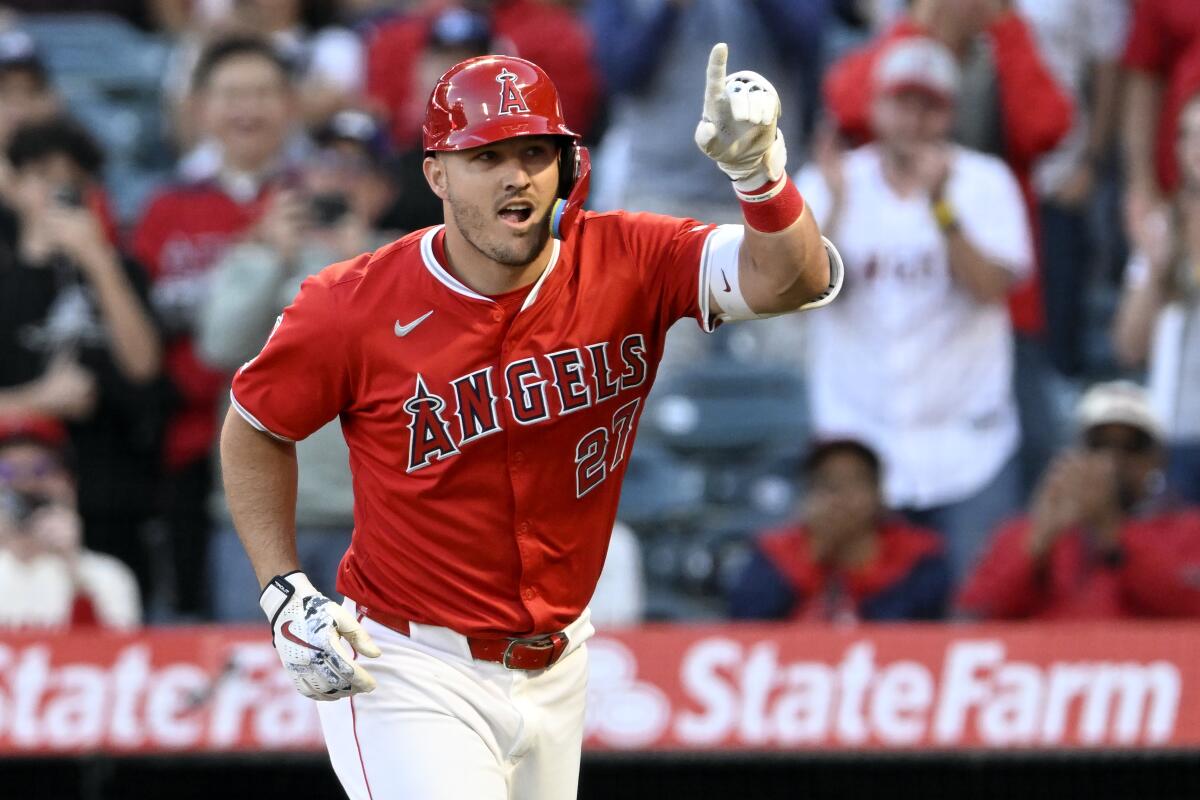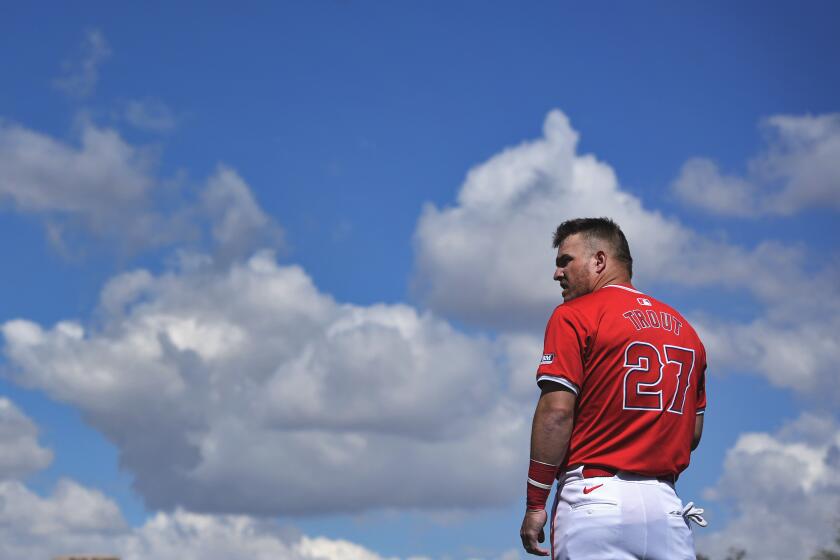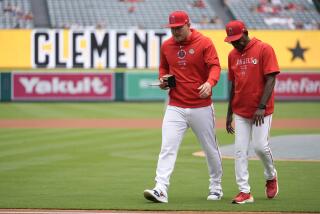Column: Mike Trout’s latest injury puts floundering Angels between a rock and a hard place

Mike Trout’s name came up in a recent conversation with a major league executive. If Trout ever did consent to a trade from the Angels — and if owner Arte Moreno ever agreed — what could the Angels reasonably expect in terms of prime prospects?
The executive sighed. The best-case scenario for the Angels might be no prime prospects, he said, because that could mean that another team had agreed to absorb the entirety of Trout’s contract.
And, the executive said, the likelihood of that scenario would range from highly unlikely to impossible. A realistic best-case scenario would be the Angels buying top prospects: fortifying a paper-thin minor league system by eating all or part of Trout’s remaining contract.
Think about that: The best outcome for the Angels could be paying another team to let the best player in franchise history finish his career somewhere else.
And think about this: That conversation took place before Tuesday, when the Angels announced Trout would undergo surgery to repair a torn meniscus in his left knee.
Angels star Mike Trout will have surgery to repair a torn meniscus in his left knee, sidelining him indefinitely.
In his first 10 seasons in the major leagues, Trout had more seasons that included a most valuable player award (three) than a stint on the injured list (two).
This latest injury means that, in the four subsequent seasons, he has been on the injured list in every one. He has not played 120 games in a season since 2019.
He turns 33 in August. His contract extends through 2030, when he turns 38. Beyond this season, he is still owed $213 million.
Only two free agents signed for that much last winter: Shohei Ohtani, because he can perform the unmatched feats of Shohei Ohtani; and Yoshinobu Yamamoto, because he is an ace at 25.
Trout might stick with Plan A, for Angel: He signed two extensions before even exploring free agency, with the intent of playing out his career with one team, just as his inspiration Derek Jeter did.
But, given the chance to restock the farm system and build back better by trading Ohtani in either of the last two summers, Moreno said no. Fair enough: The fans deserved to see the most intriguing player in baseball, and the Angels mounted a playoff push into August last season.
For this season, then, any chance of contention would depend on a healthy Trout, a healthy Anthony Rendon, and a revitalized pitching staff.
The Angels entered play Wednesday with a staff ERA of 5.08, last in the American League, and a bullpen ERA of 5.61, last in the majors. Their designated hitter Tuesday was a journeyman infielder with a career batting average of .217 and a career WAR of -2.1.
Trout and Rendon, who played a total of 19, 42, and 39 games together over the last three seasons, respectively, were on the injured list after playing 19 games together this season. Neither is expected to play again any time soon.
Ohtani, Mookie Betts, Freddie Freeman and Teoscar Hernández each had played in all 31 of the Dodgers’ games this season entering play Tuesday. The playoff chances for each team, according to Baseball Prospectus, on the last day of the first full month of the season: the Dodgers, above 99%; the Angels; below 1%.
In spring training, Moreno said this to the Orange County Register: “I’m not going to spend money just to show that we’re going to spend money unless it’s going to substantially change the team.”
The Angels haven’t made the postseason since 2014. It’s time for them to finally do something about that.
That is his choice, of course, and that choice makes perfect sense in one important respect: The Angels are not one player away.
They also are not one season away. They find themselves in a deep hole now, trying to compete without their most prominent stars, needing to depend on multiple young players who would be in the minor leagues in an organization with actual depth, staring up at the Oakland Athletics in the standings.
If Moreno stays this course, the Angels might well be run in a way the Dodgers were during their bankruptcy — not the bankruptcy part, but the part about signing veterans on one- and two-year contracts to fill out a roster.
For the 2012 season, the Dodgers signed nine veterans, all over 30, to short-term deals. One was Adam Kennedy, the second baseman on the Angels’ World Series championship team 10 years earlier. For Kennedy and four others, the season would be the last of their careers.
The Dodgers escaped limbo when the team was sold. The next year, they made the playoffs for the first time in four years, and they haven’t missed the playoffs since.
The Angels haven’t been to the playoffs in 10 years.
More to Read
Go beyond the scoreboard
Get the latest on L.A.'s teams in the daily Sports Report newsletter.
You may occasionally receive promotional content from the Los Angeles Times.









